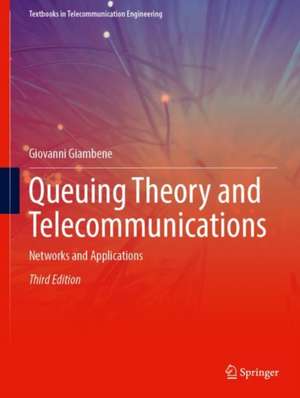Queuing Theory and Telecommunications: Networks and Applications: Textbooks in Telecommunication Engineering
Autor Giovanni Giambeneen Limba Engleză Hardback – 30 oct 2021
| Toate formatele și edițiile | Preț | Express |
|---|---|---|
| Paperback (2) | 544.77 lei 38-45 zile | |
| Springer Us – 30 apr 2017 | 544.77 lei 38-45 zile | |
| Springer International Publishing – 30 oct 2022 | 604.04 lei 6-8 săpt. | |
| Hardback (1) | 720.96 lei 38-45 zile | |
| Springer International Publishing – 30 oct 2021 | 720.96 lei 38-45 zile |
Preț: 720.96 lei
Preț vechi: 936.32 lei
-23% Nou
Puncte Express: 1081
Preț estimativ în valută:
137.95€ • 144.03$ • 114.18£
137.95€ • 144.03$ • 114.18£
Carte tipărită la comandă
Livrare economică 31 martie-07 aprilie
Preluare comenzi: 021 569.72.76
Specificații
ISBN-13: 9783030759728
ISBN-10: 3030759725
Pagini: 413
Ilustrații: XIX, 413 p. 253 illus., 38 illus. in color.
Dimensiuni: 210 x 279 mm
Greutate: 1.18 kg
Ediția:3rd ed. 2021
Editura: Springer International Publishing
Colecția Springer
Seria Textbooks in Telecommunication Engineering
Locul publicării:Cham, Switzerland
ISBN-10: 3030759725
Pagini: 413
Ilustrații: XIX, 413 p. 253 illus., 38 illus. in color.
Dimensiuni: 210 x 279 mm
Greutate: 1.18 kg
Ediția:3rd ed. 2021
Editura: Springer International Publishing
Colecția Springer
Seria Textbooks in Telecommunication Engineering
Locul publicării:Cham, Switzerland
Cuprins
Part 1. Telecommunication Networks.- Chapter 1. Introduction to Telecommunication Networks.- Chapter 2. IP-Based Networks and Future Trends.- Part 2. Queuing Theory and Applications to Networks.- Chapter 3. Survey on Probability Theory.- Chapter 4. Markov Chains and Queuing Theory.- Chapter 5. M/G/1 Queuing Theory and Applications.- Chapter 6. Local Area Networks and Analysis.- Chapter 7. Networks of Queues.
Notă biografică
Giovanni Giambene received the Dr. Ing. degree in Electronics in 1993 and the Ph.D. degree in Telecommunications and Informatics in 1997, both from the University of Florence, Italy. From 1994 to 1997, he was with the Electronic Engineering Department of the University of Florence, Italy. He was Technical External Secretary of the European Community COST 227 Action (“Integrated Space/Terrestrial Mobile Networks”). He also contributed to the SAINT Project (“Satellite Integration in the Future Mobile Network”, RACE 2117). From 1997 to 1998, he was with OTE (Marconi Group) in Florence, Italy, working on a GSM development program. In 1999, he joined the Department of Information Engineering and Mathematical Sciences of the University of Siena, Italy. At present, he is an associate professor, teaching the first-level course on Fundamentals on Telecommunications and the advanced course on Networking at the University of Siena. From 2000 to 2003, he contributed to the EU FP5 “Personalised Access to Local Information and services for tourists” (PALIO) IST Project. He was vice-Chair of the COST 290 Action (2004-2008), entitled “Traffic and QoS Management in Wireless Multimedia Networks” (Wi-QoST). He participated to: (i) the SatNEx I & II network of excellence (EU FP6, 2004-2009) and SatNEx III (ESA 2010-2013) as work package leader on radio access techniques, cross-layer air interface design, and network coding techniques for satellite systems; (ii) the EU FP7 Coordination Action “Road mapping technology for enhancing security to protect medical & genetic data” (RADICAL) as work package leader on security and privacy; (iii) the COST Action IC0906 (2010-2014) “Wireless Networking for Moving Objects” (WiNeMO) as national representative. At present, he is involved in the ESA IIT Project ROMANTICA with AIRBUS and the ESA SatNEX V project. Giambene is IEEE senior member. He was IEEE Communications Letters associate editor. Since 2015, he is IEEE Transactions on Vehicular Technology editor. Since 2019, he is IEEE Wireless Communications editor. He has published the following books: G. Giambene, “Queuing Theory and Telecommunications: Networks and Telecommunications”, Springer, April 2014 (2nd edition); G. Giambene (Ed.), “Resource Management in Satellite Networks: Optimization and Cross-Layer Design”, Springer, April 2007.
Textul de pe ultima copertă
This thoroughly revised textbook provides a description of current networking technologies and protocols as well as important new tools for network performance analysis based on queuing theory. The third edition adds topics such as network virtualization and new related architectures, novel satellite systems (such as Space X, OneWeb), jitter and its impact on streaming services, packet level FEC techniques and network coding, new Markovian models, and advanced details on M/G/1 queuing models. The author also adds new selected exercises throughout the chapters and a new version of the slides and the solution manual. The book maintains its organization with networking technologies and protocols in Part I and then theory and exercises with applications to the different technologies and protocols in Part II. This book is intended as a textbook for master level courses in networking and telecommunications sectors.
- Thoroughly revised to cover the latest methods and practical applications used for telecommunication network analysis and design
- Features new topics such as network virtualization, satellite systems, and new Markovian and M/G/1 models
- Includes updated exercises throughout the book and updated slides and solution manual
Caracteristici
Thoroughly revised to cover the latest methods and practical applications used for telecommunication network analysis and design Features new topics such as network virtualization, satellite systems, and new Markovian and M/G/1 models Includes updated exercises throughout the book and updated slides and solution manual Request lecturer material: sn.pub/lecturer-material
Recenzii
“This book is a fantastic exposition of soundconcepts explained beautifully. … it is clearly an advanced undergraduate orgraduate-level book. Researchers will love it. … it has all the necessaryingredients to turn into a longtime classic book in this area. The authorsuccessfully pulls together all of the necessary research and knowledge in thearea of computer network theory.” (Naga Narayanaswamy, Computing Reviews, December,2015)














